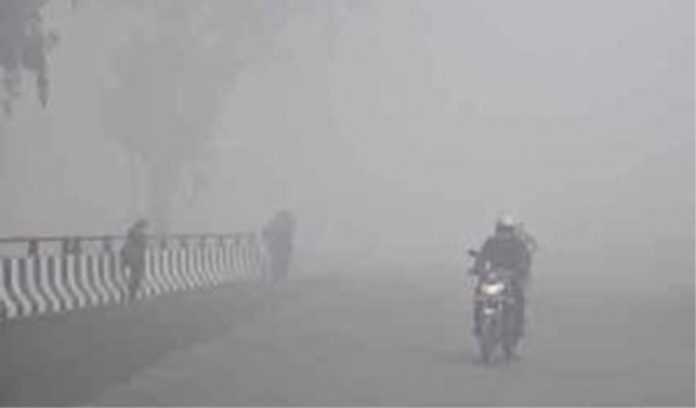Srinagar hottest in Jan after 14 years at 15°C
Fayaz Bukhari/
Bivek Mathur
SRINAGAR/JAMMU, Jan 13: Jammu continued to experience extreme cold, with no relief from the foggy weather conditions.
However, both minimum and maximum temperatures increased by 0.3 to 0.4 degrees Celsius today compared to the previous day due to overcast conditions.
Surprisingly, Srinagar witnessed the warmest day in 14 years during “Chillai-Kalan,” the harshest winter period, with temperatures reaching a maximum of 15.0 degrees Celsius.
A meteorological department official said that the weather is expected to remain largely dry with dense fog for the next three days, followed by isolated rain in both Jammu and Kashmir regions.
The official reported that Jammu City recorded a minimum temperature of 4.0°C today, three notches below the normal (7.0°C), and a maximum temperature of 8.9°C, nine notches below the normal temperature of 17.9 degrees Celsius.
“This showed a slight improvement in both minimum and maximum temperatures due to the cloudy sky,” he said, as according to him, the minimum temperature in the city was 3.7 degrees Celsius yesterday, and the maximum temperature was 8.5°C.
He further said that the highest temperature of 20.9°C was recorded over the Katra station in the Jammu region, followed by 20.8°C in Banihal, 19.4°C in Batote, and 18.4°C in Bhaderwah.
The lowest temperature of 3.0°C was recorded over Banihal station, followed by 4.0°C in Jammu, 5.8°C in Bhaderwah, 7.2°C in Katra, and 8.0°C in Katra, he added.
With Jammu being the second coldest city in the region due to the prevailing foggy weather conditions, 13 flights and 11 trains reaching or departing the region got delayed from their routine time.
A Northern Railway official said that Puja Express reached 12 hours late from its arrival time, Malwa Express got delayed by 6 hours in reaching Jammu, Jhelam Express by 10 hours, Super Express by 8 hours, Sealdah Express by 3 hours, Muri Express by 4 hours, Shalimaar Express by 45 minutes, Uttar Sampark Kranti Express by 1 hour, Hemkunt Express by 49 minutes, and Amarnath Express by 5 hours.
Only one train, Puja Express, ran 7 hours and 45 minutes late from its departure time from Jammu Tawi Railway Station, he said.
A Meteorological Department official told Excelsior that today’s temperature in Srinagar was the sixth highest record temperature in over a century as Srinagar recorded 15.1°C on 23 January 2003, 15.5°C on 9 January 1976, 15.7°C on 31 January 2001, 15.8°C on 25 January 2010 and 17.2°C on 23 January 1902.
Qazigund recorded a maximum of 15.8 degree Celsius which is 9.8 degree Celsius above normal for the place during this time of the year.
Pahalgam recorded a maximum of 13.1 degree Celsius which is 9.0 degree Celsius above normal for the place during this time of the year.
Kupwara recorded a maximum of 15.8 degree Celsius which is 9.3 degree Celsius above normal for the place during this time of the year.
Kokernag recorded a maximum of 13.4 degree Celsius which is 9.1 degree Celsius above normal for the place during this time of the year.
Gulmarg recorded a maximum of 9.0 degree Celsius which is 8.6 degree Celsius above normal for the place during this time of the year.
The feeble western disturbance over Kashmir led to light snowfall in Gurez in Bandipora district. Several parts of the Valley saw a rise in minimum temperatures due to cloudy skies. Night temperatures settled several degrees above the normal for this time of the season.
Srinagar city recorded a minimum temperature of 0.2 degrees Celsius last night, up from the previous night’s minus 4 degrees Celsius.
Qazigund recorded a low of minus 2 degrees. The ski resort of Gulmarg recorded a low of minus 1 degree Celsius – up from minus 3.2 degrees Celsius previous night.
Pahalgam recorded a minimum temperature of minus 0.6 degrees Celsius – up from minus 5.3 degrees Celsius the previous night.
The minimum temperature in Kokernag town settled at minus 1.2 degrees Celsius, while it was minus 0.3 degrees Celsius in Kupwara.
The weatherman has forecast the possibility of light snow over isolated higher reaches due to feeble Western Disturbances (WDs) approaching on January 16 and 20 but said that dry weather is likely to continue till January 23.
“Dry weather is likely to continue till January 23 with feeble WDs approaching on 16th and 20th evening,” the MeT official here told Excelsior.
Under the influence of these WDs, he said, generally cloudy weather with light snow over isolated higher reaches is expected. From January 21-23, he said, generally dry weather is expected.
Kashmir valley is under ‘Chillai-Kalan’, the 40-day harsh period of winter, which will end on January 30. However, it does not mean an end to the winter. It is followed by a 20-day-long period called ‘Chillai-Khurd’ that occurs between January 30 and February 19 and a 10-day-long period ‘Chillai-Bachha’ (baby cold) which is from February 20 to March 1.


